BHP Billiton: Analysis of Business Strategy in Australian Market
VerifiedAdded on 2020/04/07
|22
|3134
|743
Report
AI Summary
This report provides an in-depth analysis of BHP Billiton's business strategy, focusing on its operations within the Australian market and its global presence. It examines the company's competitive advantages through Porter's Generic Strategies (cost leadership, differentiation, and focus), highlighting its market penetration and consistent business model. The report also delves into the trends within the Australian steel manufacturing industry and provides internal and external analyses using the VRIO framework and PESTLE and Porter's Five Forces analyses, respectively. The report highlights BHP Billiton's strengths, including its management talent, resources, and capabilities, while also considering external factors such as political, economic, social, technological, legal, and environmental influences. The analysis concludes with a discussion of BHP Billiton's strategic positioning and its ability to navigate the complexities of the global market.
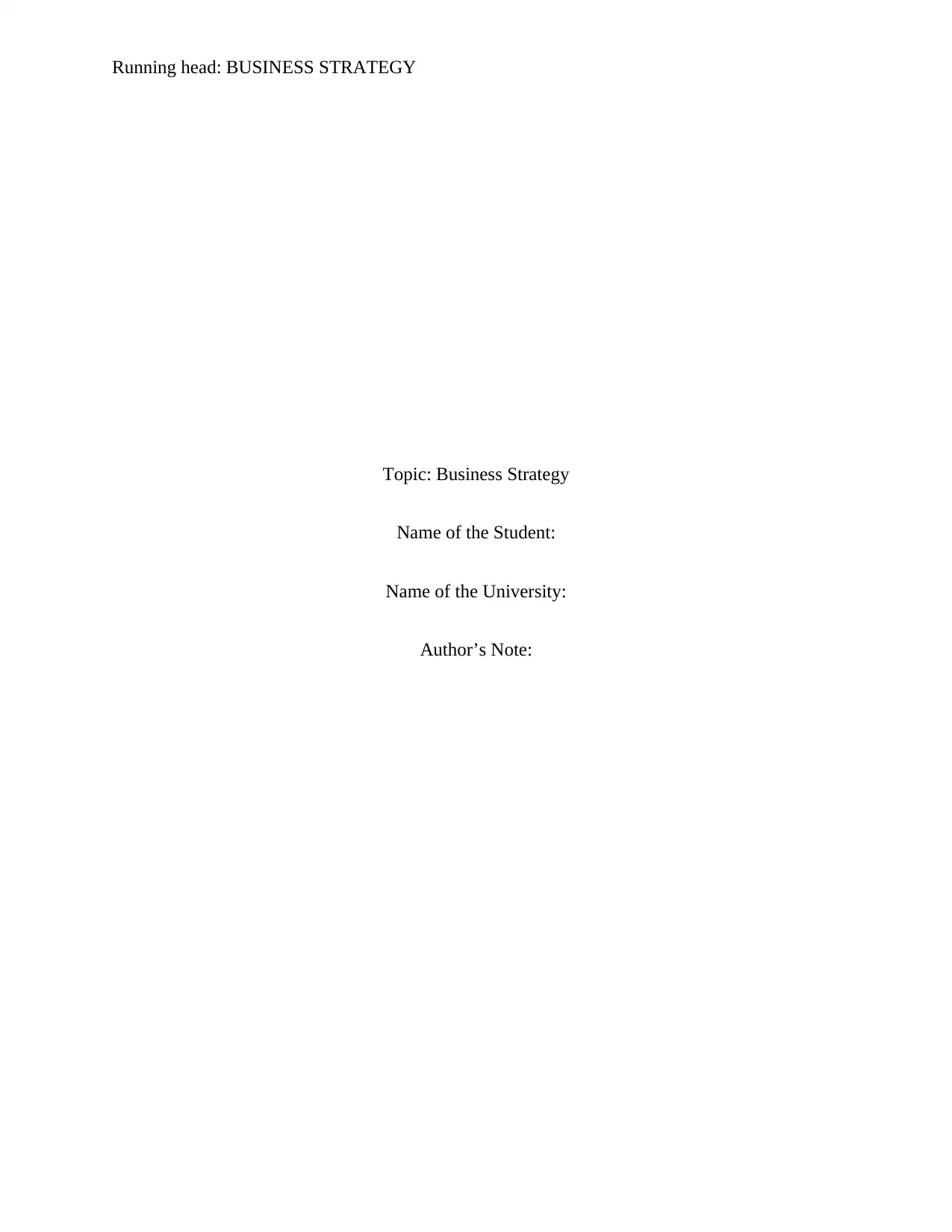
Running head: BUSINESS STRATEGY
Topic: Business Strategy
Name of the Student:
Name of the University:
Author’s Note:
Topic: Business Strategy
Name of the Student:
Name of the University:
Author’s Note:
Paraphrase This Document
Need a fresh take? Get an instant paraphrase of this document with our AI Paraphraser
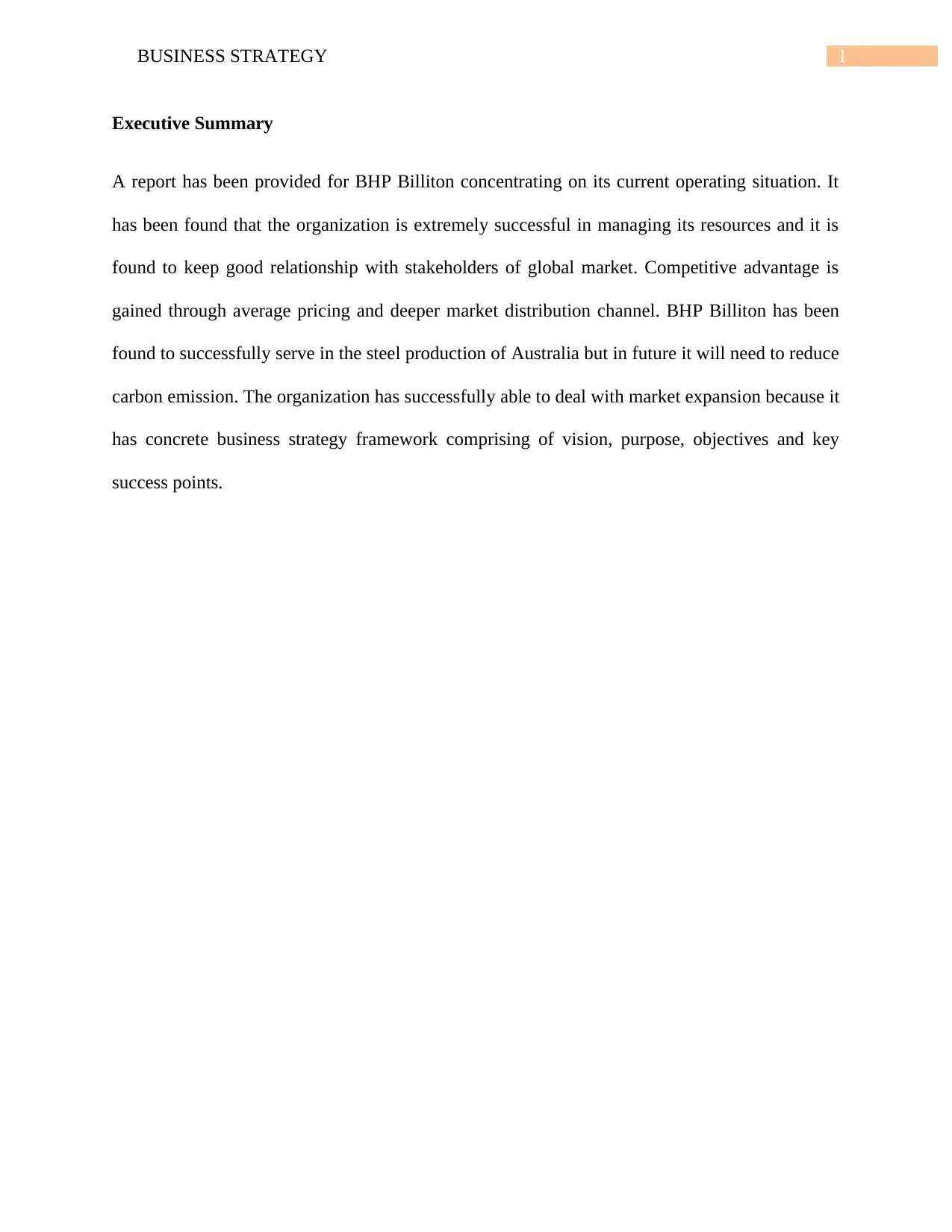
1BUSINESS STRATEGY
Executive Summary
A report has been provided for BHP Billiton concentrating on its current operating situation. It
has been found that the organization is extremely successful in managing its resources and it is
found to keep good relationship with stakeholders of global market. Competitive advantage is
gained through average pricing and deeper market distribution channel. BHP Billiton has been
found to successfully serve in the steel production of Australia but in future it will need to reduce
carbon emission. The organization has successfully able to deal with market expansion because it
has concrete business strategy framework comprising of vision, purpose, objectives and key
success points.
Executive Summary
A report has been provided for BHP Billiton concentrating on its current operating situation. It
has been found that the organization is extremely successful in managing its resources and it is
found to keep good relationship with stakeholders of global market. Competitive advantage is
gained through average pricing and deeper market distribution channel. BHP Billiton has been
found to successfully serve in the steel production of Australia but in future it will need to reduce
carbon emission. The organization has successfully able to deal with market expansion because it
has concrete business strategy framework comprising of vision, purpose, objectives and key
success points.
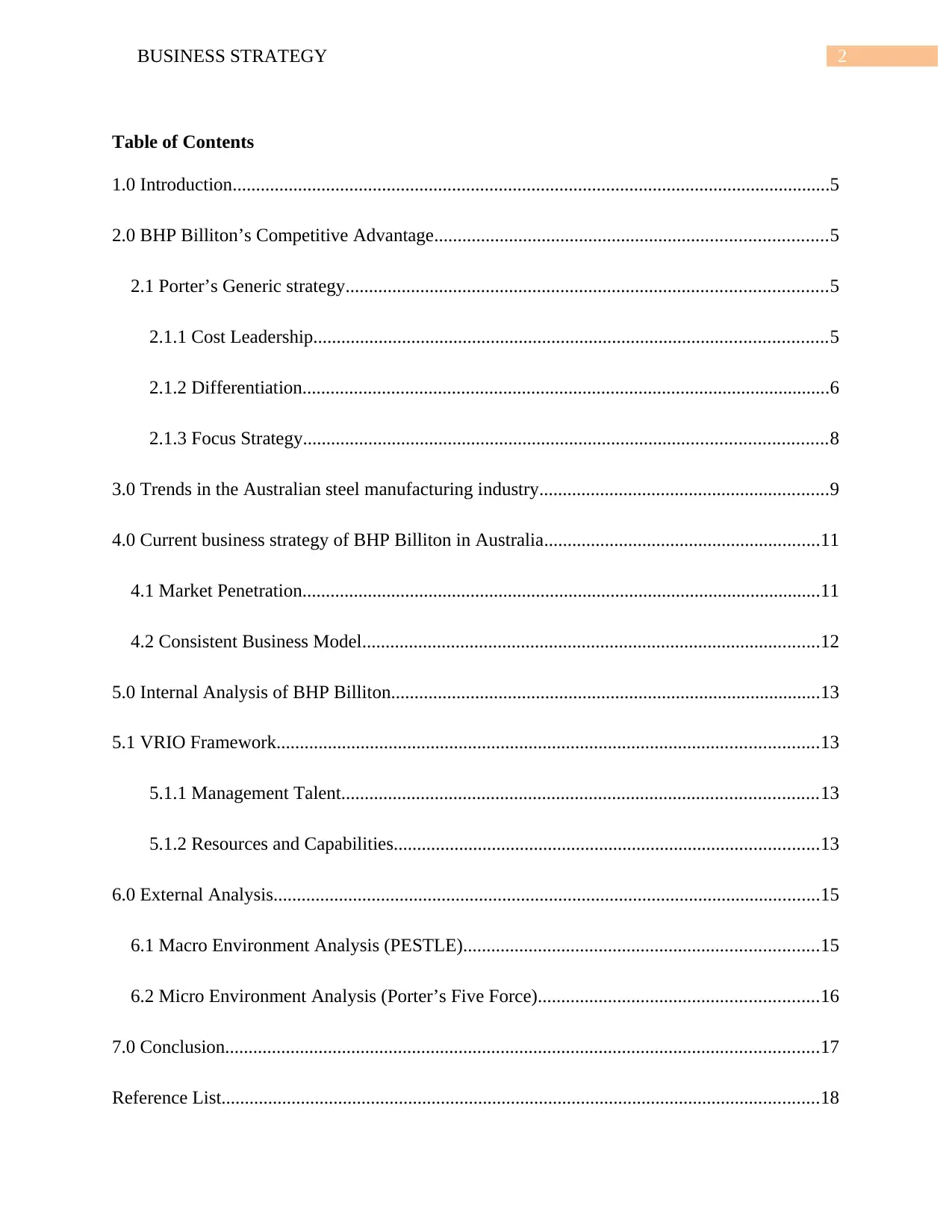
2BUSINESS STRATEGY
Table of Contents
1.0 Introduction................................................................................................................................5
2.0 BHP Billiton’s Competitive Advantage....................................................................................5
2.1 Porter’s Generic strategy.......................................................................................................5
2.1.1 Cost Leadership..............................................................................................................5
2.1.2 Differentiation.................................................................................................................6
2.1.3 Focus Strategy................................................................................................................8
3.0 Trends in the Australian steel manufacturing industry..............................................................9
4.0 Current business strategy of BHP Billiton in Australia...........................................................11
4.1 Market Penetration...............................................................................................................11
4.2 Consistent Business Model..................................................................................................12
5.0 Internal Analysis of BHP Billiton............................................................................................13
5.1 VRIO Framework....................................................................................................................13
5.1.1 Management Talent......................................................................................................13
5.1.2 Resources and Capabilities...........................................................................................13
6.0 External Analysis.....................................................................................................................15
6.1 Macro Environment Analysis (PESTLE)............................................................................15
6.2 Micro Environment Analysis (Porter’s Five Force)............................................................16
7.0 Conclusion...............................................................................................................................17
Reference List................................................................................................................................18
Table of Contents
1.0 Introduction................................................................................................................................5
2.0 BHP Billiton’s Competitive Advantage....................................................................................5
2.1 Porter’s Generic strategy.......................................................................................................5
2.1.1 Cost Leadership..............................................................................................................5
2.1.2 Differentiation.................................................................................................................6
2.1.3 Focus Strategy................................................................................................................8
3.0 Trends in the Australian steel manufacturing industry..............................................................9
4.0 Current business strategy of BHP Billiton in Australia...........................................................11
4.1 Market Penetration...............................................................................................................11
4.2 Consistent Business Model..................................................................................................12
5.0 Internal Analysis of BHP Billiton............................................................................................13
5.1 VRIO Framework....................................................................................................................13
5.1.1 Management Talent......................................................................................................13
5.1.2 Resources and Capabilities...........................................................................................13
6.0 External Analysis.....................................................................................................................15
6.1 Macro Environment Analysis (PESTLE)............................................................................15
6.2 Micro Environment Analysis (Porter’s Five Force)............................................................16
7.0 Conclusion...............................................................................................................................17
Reference List................................................................................................................................18
⊘ This is a preview!⊘
Do you want full access?
Subscribe today to unlock all pages.

Trusted by 1+ million students worldwide
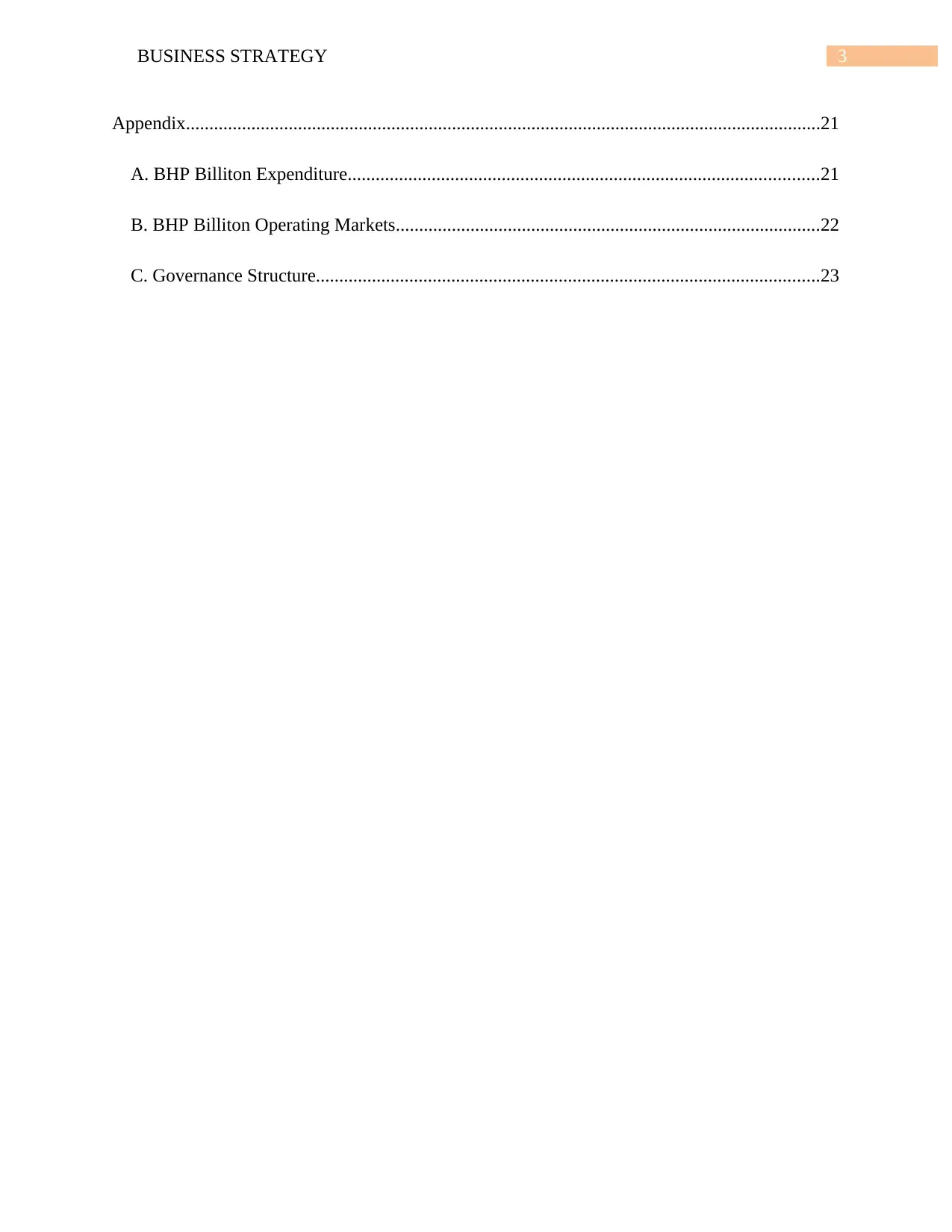
3BUSINESS STRATEGY
Appendix........................................................................................................................................21
A. BHP Billiton Expenditure.....................................................................................................21
B. BHP Billiton Operating Markets...........................................................................................22
C. Governance Structure............................................................................................................23
Appendix........................................................................................................................................21
A. BHP Billiton Expenditure.....................................................................................................21
B. BHP Billiton Operating Markets...........................................................................................22
C. Governance Structure............................................................................................................23
Paraphrase This Document
Need a fresh take? Get an instant paraphrase of this document with our AI Paraphraser
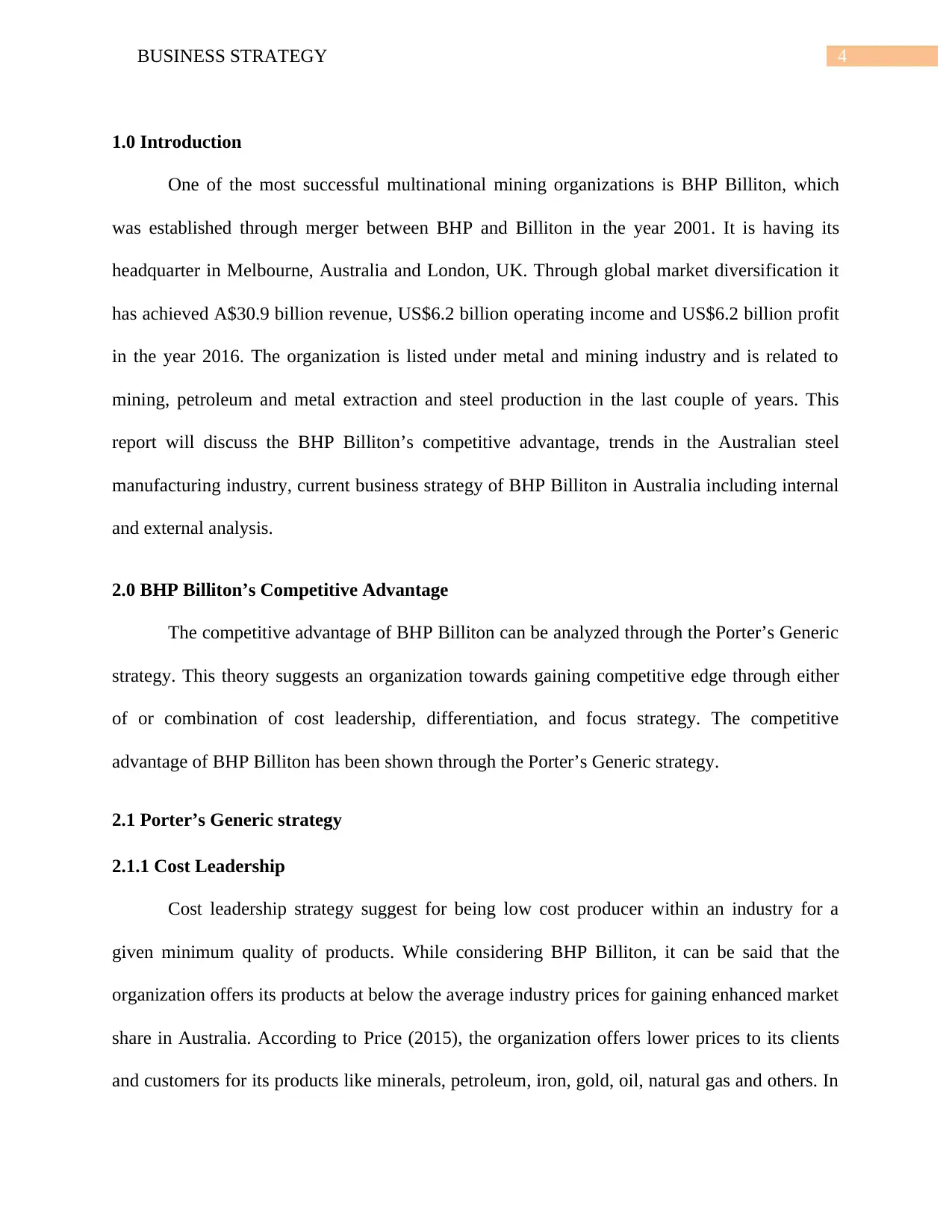
4BUSINESS STRATEGY
1.0 Introduction
One of the most successful multinational mining organizations is BHP Billiton, which
was established through merger between BHP and Billiton in the year 2001. It is having its
headquarter in Melbourne, Australia and London, UK. Through global market diversification it
has achieved A$30.9 billion revenue, US$6.2 billion operating income and US$6.2 billion profit
in the year 2016. The organization is listed under metal and mining industry and is related to
mining, petroleum and metal extraction and steel production in the last couple of years. This
report will discuss the BHP Billiton’s competitive advantage, trends in the Australian steel
manufacturing industry, current business strategy of BHP Billiton in Australia including internal
and external analysis.
2.0 BHP Billiton’s Competitive Advantage
The competitive advantage of BHP Billiton can be analyzed through the Porter’s Generic
strategy. This theory suggests an organization towards gaining competitive edge through either
of or combination of cost leadership, differentiation, and focus strategy. The competitive
advantage of BHP Billiton has been shown through the Porter’s Generic strategy.
2.1 Porter’s Generic strategy
2.1.1 Cost Leadership
Cost leadership strategy suggest for being low cost producer within an industry for a
given minimum quality of products. While considering BHP Billiton, it can be said that the
organization offers its products at below the average industry prices for gaining enhanced market
share in Australia. According to Price (2015), the organization offers lower prices to its clients
and customers for its products like minerals, petroleum, iron, gold, oil, natural gas and others. In
1.0 Introduction
One of the most successful multinational mining organizations is BHP Billiton, which
was established through merger between BHP and Billiton in the year 2001. It is having its
headquarter in Melbourne, Australia and London, UK. Through global market diversification it
has achieved A$30.9 billion revenue, US$6.2 billion operating income and US$6.2 billion profit
in the year 2016. The organization is listed under metal and mining industry and is related to
mining, petroleum and metal extraction and steel production in the last couple of years. This
report will discuss the BHP Billiton’s competitive advantage, trends in the Australian steel
manufacturing industry, current business strategy of BHP Billiton in Australia including internal
and external analysis.
2.0 BHP Billiton’s Competitive Advantage
The competitive advantage of BHP Billiton can be analyzed through the Porter’s Generic
strategy. This theory suggests an organization towards gaining competitive edge through either
of or combination of cost leadership, differentiation, and focus strategy. The competitive
advantage of BHP Billiton has been shown through the Porter’s Generic strategy.
2.1 Porter’s Generic strategy
2.1.1 Cost Leadership
Cost leadership strategy suggest for being low cost producer within an industry for a
given minimum quality of products. While considering BHP Billiton, it can be said that the
organization offers its products at below the average industry prices for gaining enhanced market
share in Australia. According to Price (2015), the organization offers lower prices to its clients
and customers for its products like minerals, petroleum, iron, gold, oil, natural gas and others. In
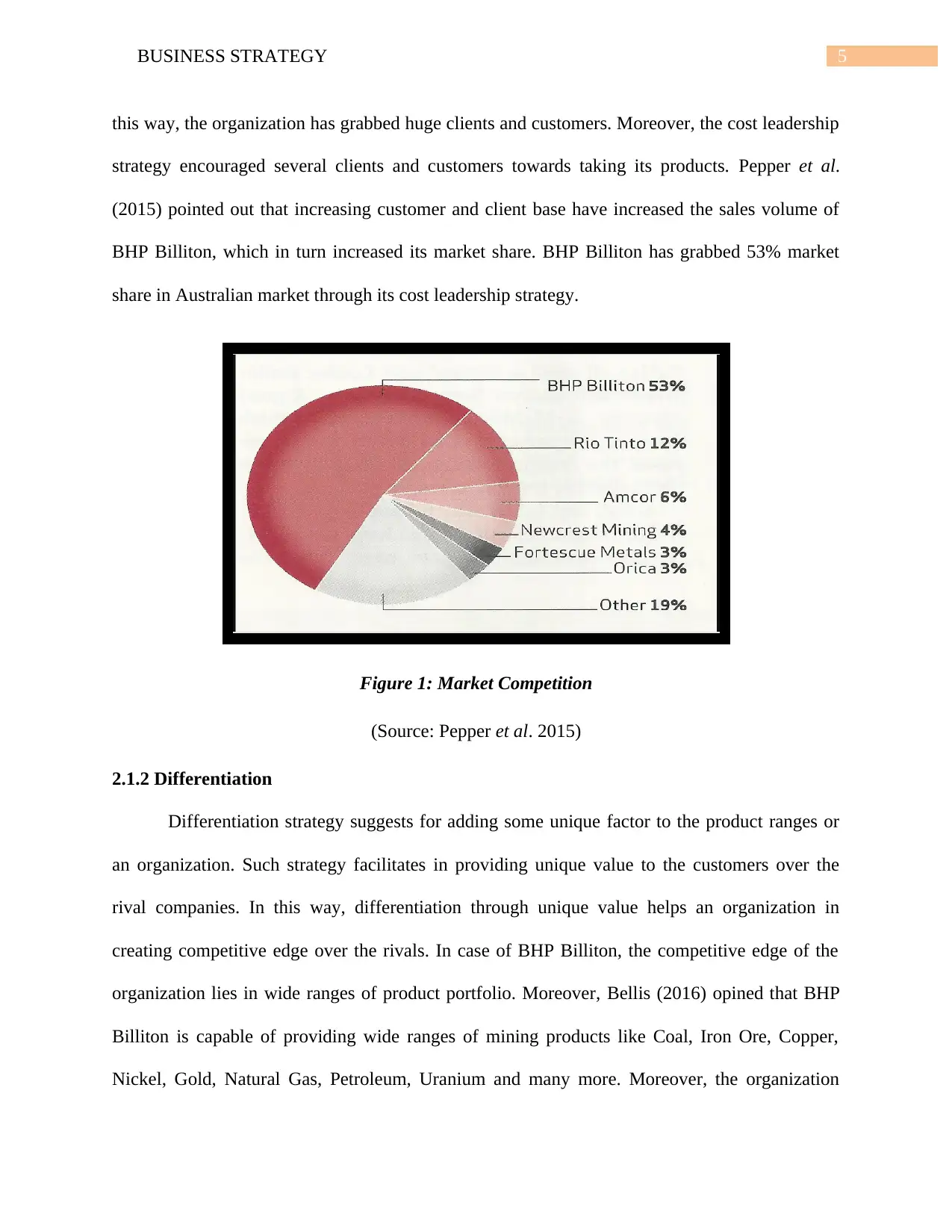
5BUSINESS STRATEGY
this way, the organization has grabbed huge clients and customers. Moreover, the cost leadership
strategy encouraged several clients and customers towards taking its products. Pepper et al.
(2015) pointed out that increasing customer and client base have increased the sales volume of
BHP Billiton, which in turn increased its market share. BHP Billiton has grabbed 53% market
share in Australian market through its cost leadership strategy.
Figure 1: Market Competition
(Source: Pepper et al. 2015)
2.1.2 Differentiation
Differentiation strategy suggests for adding some unique factor to the product ranges or
an organization. Such strategy facilitates in providing unique value to the customers over the
rival companies. In this way, differentiation through unique value helps an organization in
creating competitive edge over the rivals. In case of BHP Billiton, the competitive edge of the
organization lies in wide ranges of product portfolio. Moreover, Bellis (2016) opined that BHP
Billiton is capable of providing wide ranges of mining products like Coal, Iron Ore, Copper,
Nickel, Gold, Natural Gas, Petroleum, Uranium and many more. Moreover, the organization
this way, the organization has grabbed huge clients and customers. Moreover, the cost leadership
strategy encouraged several clients and customers towards taking its products. Pepper et al.
(2015) pointed out that increasing customer and client base have increased the sales volume of
BHP Billiton, which in turn increased its market share. BHP Billiton has grabbed 53% market
share in Australian market through its cost leadership strategy.
Figure 1: Market Competition
(Source: Pepper et al. 2015)
2.1.2 Differentiation
Differentiation strategy suggests for adding some unique factor to the product ranges or
an organization. Such strategy facilitates in providing unique value to the customers over the
rival companies. In this way, differentiation through unique value helps an organization in
creating competitive edge over the rivals. In case of BHP Billiton, the competitive edge of the
organization lies in wide ranges of product portfolio. Moreover, Bellis (2016) opined that BHP
Billiton is capable of providing wide ranges of mining products like Coal, Iron Ore, Copper,
Nickel, Gold, Natural Gas, Petroleum, Uranium and many more. Moreover, the organization
⊘ This is a preview!⊘
Do you want full access?
Subscribe today to unlock all pages.

Trusted by 1+ million students worldwide
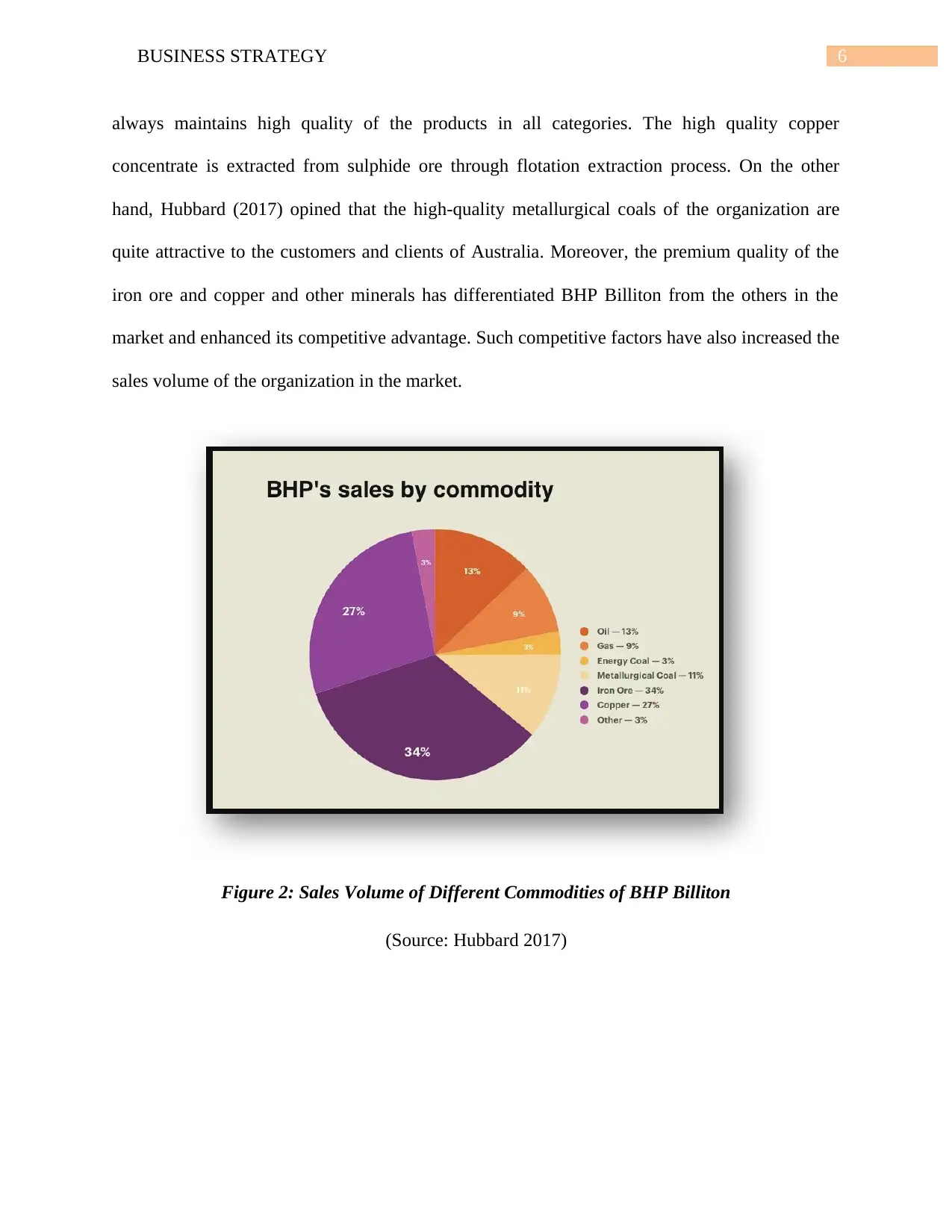
6BUSINESS STRATEGY
always maintains high quality of the products in all categories. The high quality copper
concentrate is extracted from sulphide ore through flotation extraction process. On the other
hand, Hubbard (2017) opined that the high-quality metallurgical coals of the organization are
quite attractive to the customers and clients of Australia. Moreover, the premium quality of the
iron ore and copper and other minerals has differentiated BHP Billiton from the others in the
market and enhanced its competitive advantage. Such competitive factors have also increased the
sales volume of the organization in the market.
Figure 2: Sales Volume of Different Commodities of BHP Billiton
(Source: Hubbard 2017)
always maintains high quality of the products in all categories. The high quality copper
concentrate is extracted from sulphide ore through flotation extraction process. On the other
hand, Hubbard (2017) opined that the high-quality metallurgical coals of the organization are
quite attractive to the customers and clients of Australia. Moreover, the premium quality of the
iron ore and copper and other minerals has differentiated BHP Billiton from the others in the
market and enhanced its competitive advantage. Such competitive factors have also increased the
sales volume of the organization in the market.
Figure 2: Sales Volume of Different Commodities of BHP Billiton
(Source: Hubbard 2017)
Paraphrase This Document
Need a fresh take? Get an instant paraphrase of this document with our AI Paraphraser
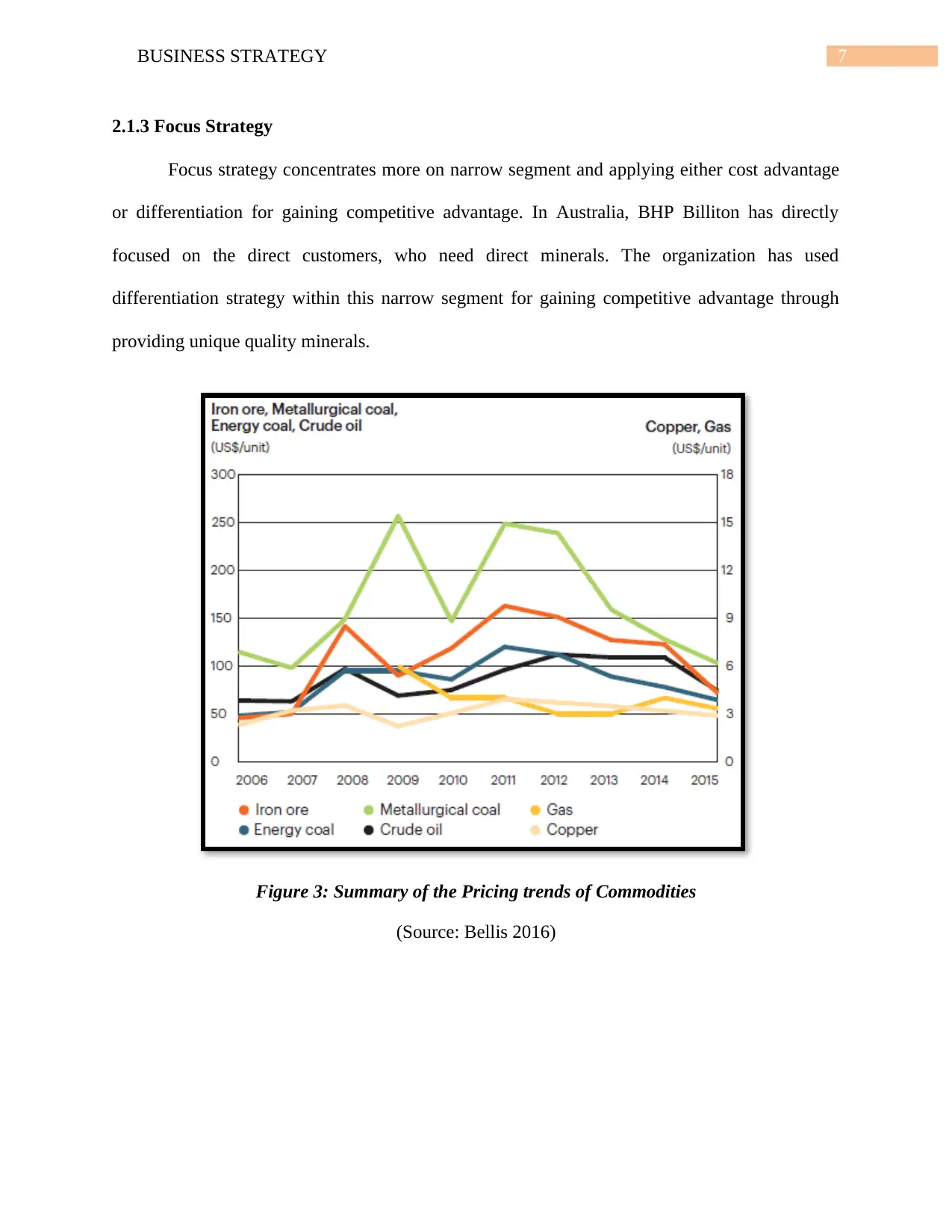
7BUSINESS STRATEGY
2.1.3 Focus Strategy
Focus strategy concentrates more on narrow segment and applying either cost advantage
or differentiation for gaining competitive advantage. In Australia, BHP Billiton has directly
focused on the direct customers, who need direct minerals. The organization has used
differentiation strategy within this narrow segment for gaining competitive advantage through
providing unique quality minerals.
Figure 3: Summary of the Pricing trends of Commodities
(Source: Bellis 2016)
2.1.3 Focus Strategy
Focus strategy concentrates more on narrow segment and applying either cost advantage
or differentiation for gaining competitive advantage. In Australia, BHP Billiton has directly
focused on the direct customers, who need direct minerals. The organization has used
differentiation strategy within this narrow segment for gaining competitive advantage through
providing unique quality minerals.
Figure 3: Summary of the Pricing trends of Commodities
(Source: Bellis 2016)
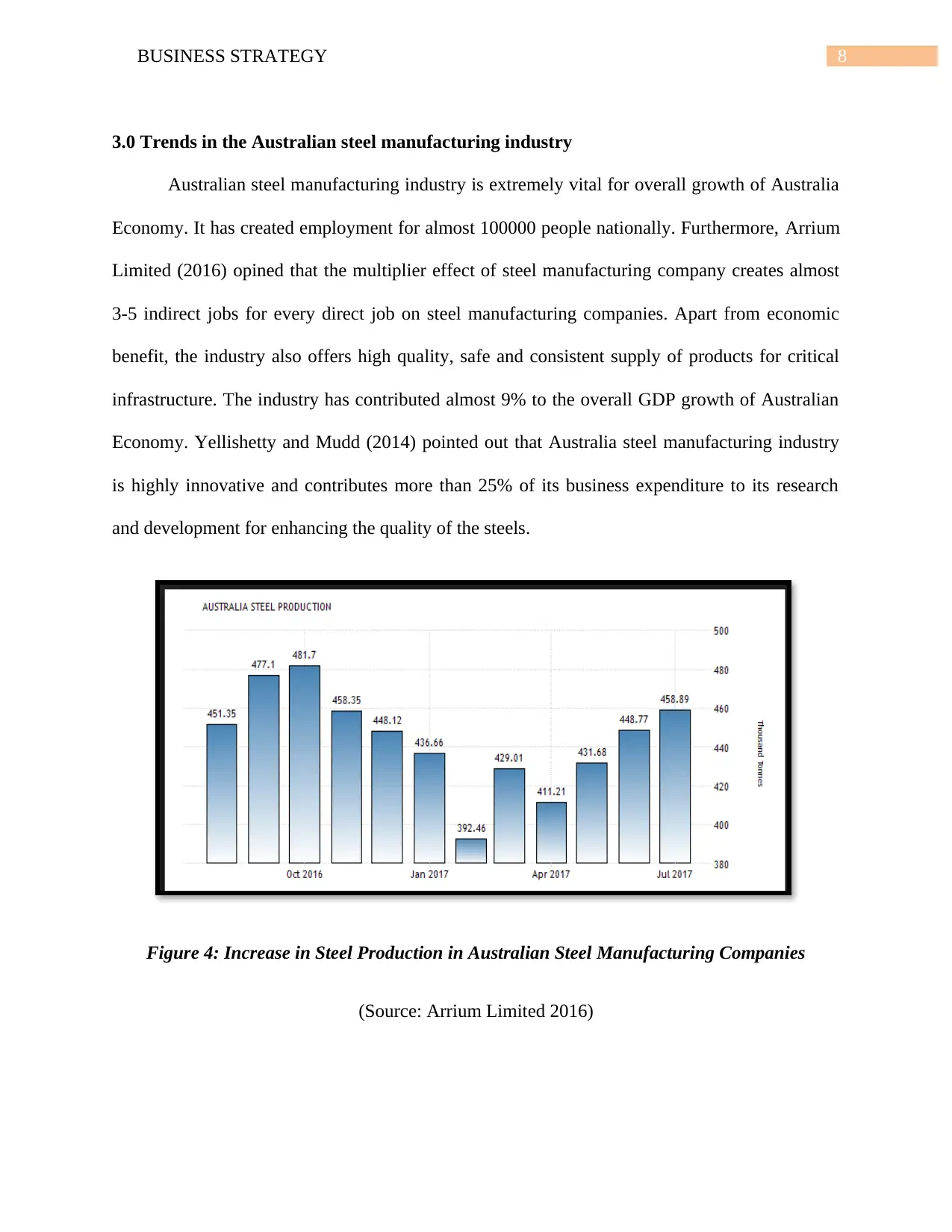
8BUSINESS STRATEGY
3.0 Trends in the Australian steel manufacturing industry
Australian steel manufacturing industry is extremely vital for overall growth of Australia
Economy. It has created employment for almost 100000 people nationally. Furthermore, Arrium
Limited (2016) opined that the multiplier effect of steel manufacturing company creates almost
3-5 indirect jobs for every direct job on steel manufacturing companies. Apart from economic
benefit, the industry also offers high quality, safe and consistent supply of products for critical
infrastructure. The industry has contributed almost 9% to the overall GDP growth of Australian
Economy. Yellishetty and Mudd (2014) pointed out that Australia steel manufacturing industry
is highly innovative and contributes more than 25% of its business expenditure to its research
and development for enhancing the quality of the steels.
Figure 4: Increase in Steel Production in Australian Steel Manufacturing Companies
(Source: Arrium Limited 2016)
3.0 Trends in the Australian steel manufacturing industry
Australian steel manufacturing industry is extremely vital for overall growth of Australia
Economy. It has created employment for almost 100000 people nationally. Furthermore, Arrium
Limited (2016) opined that the multiplier effect of steel manufacturing company creates almost
3-5 indirect jobs for every direct job on steel manufacturing companies. Apart from economic
benefit, the industry also offers high quality, safe and consistent supply of products for critical
infrastructure. The industry has contributed almost 9% to the overall GDP growth of Australian
Economy. Yellishetty and Mudd (2014) pointed out that Australia steel manufacturing industry
is highly innovative and contributes more than 25% of its business expenditure to its research
and development for enhancing the quality of the steels.
Figure 4: Increase in Steel Production in Australian Steel Manufacturing Companies
(Source: Arrium Limited 2016)
⊘ This is a preview!⊘
Do you want full access?
Subscribe today to unlock all pages.

Trusted by 1+ million students worldwide
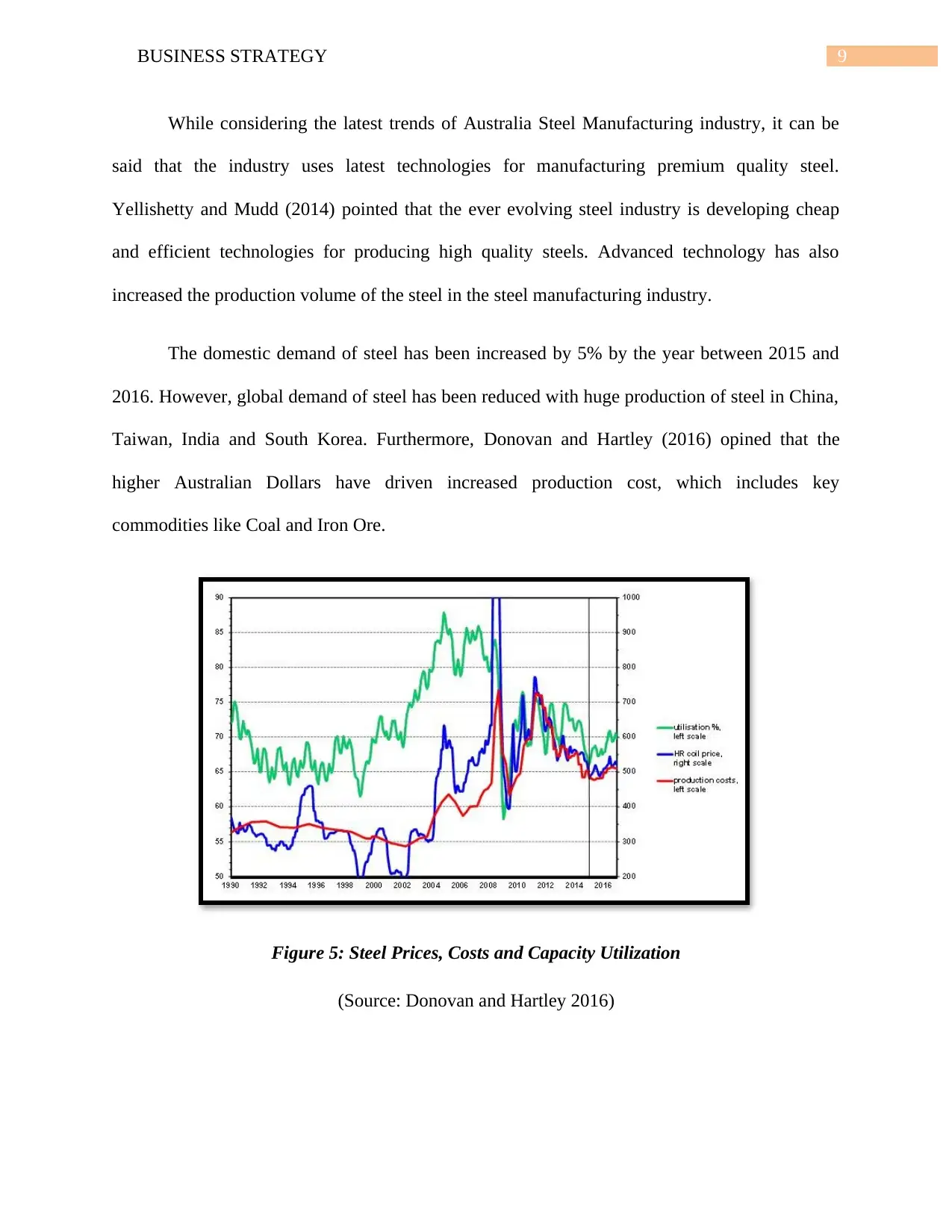
9BUSINESS STRATEGY
While considering the latest trends of Australia Steel Manufacturing industry, it can be
said that the industry uses latest technologies for manufacturing premium quality steel.
Yellishetty and Mudd (2014) pointed that the ever evolving steel industry is developing cheap
and efficient technologies for producing high quality steels. Advanced technology has also
increased the production volume of the steel in the steel manufacturing industry.
The domestic demand of steel has been increased by 5% by the year between 2015 and
2016. However, global demand of steel has been reduced with huge production of steel in China,
Taiwan, India and South Korea. Furthermore, Donovan and Hartley (2016) opined that the
higher Australian Dollars have driven increased production cost, which includes key
commodities like Coal and Iron Ore.
Figure 5: Steel Prices, Costs and Capacity Utilization
(Source: Donovan and Hartley 2016)
While considering the latest trends of Australia Steel Manufacturing industry, it can be
said that the industry uses latest technologies for manufacturing premium quality steel.
Yellishetty and Mudd (2014) pointed that the ever evolving steel industry is developing cheap
and efficient technologies for producing high quality steels. Advanced technology has also
increased the production volume of the steel in the steel manufacturing industry.
The domestic demand of steel has been increased by 5% by the year between 2015 and
2016. However, global demand of steel has been reduced with huge production of steel in China,
Taiwan, India and South Korea. Furthermore, Donovan and Hartley (2016) opined that the
higher Australian Dollars have driven increased production cost, which includes key
commodities like Coal and Iron Ore.
Figure 5: Steel Prices, Costs and Capacity Utilization
(Source: Donovan and Hartley 2016)
Paraphrase This Document
Need a fresh take? Get an instant paraphrase of this document with our AI Paraphraser
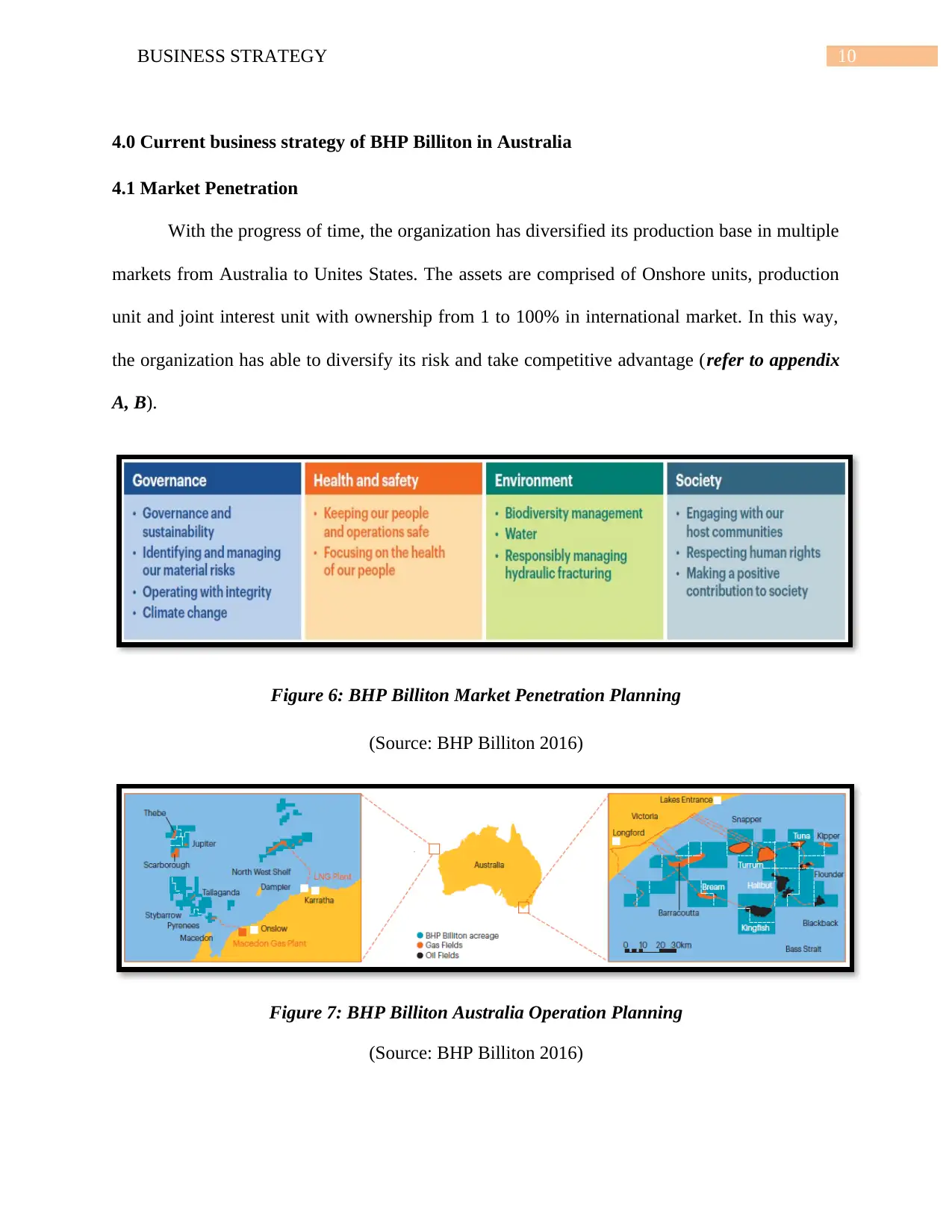
10BUSINESS STRATEGY
4.0 Current business strategy of BHP Billiton in Australia
4.1 Market Penetration
With the progress of time, the organization has diversified its production base in multiple
markets from Australia to Unites States. The assets are comprised of Onshore units, production
unit and joint interest unit with ownership from 1 to 100% in international market. In this way,
the organization has able to diversify its risk and take competitive advantage (refer to appendix
A, B).
Figure 6: BHP Billiton Market Penetration Planning
(Source: BHP Billiton 2016)
Figure 7: BHP Billiton Australia Operation Planning
(Source: BHP Billiton 2016)
4.0 Current business strategy of BHP Billiton in Australia
4.1 Market Penetration
With the progress of time, the organization has diversified its production base in multiple
markets from Australia to Unites States. The assets are comprised of Onshore units, production
unit and joint interest unit with ownership from 1 to 100% in international market. In this way,
the organization has able to diversify its risk and take competitive advantage (refer to appendix
A, B).
Figure 6: BHP Billiton Market Penetration Planning
(Source: BHP Billiton 2016)
Figure 7: BHP Billiton Australia Operation Planning
(Source: BHP Billiton 2016)
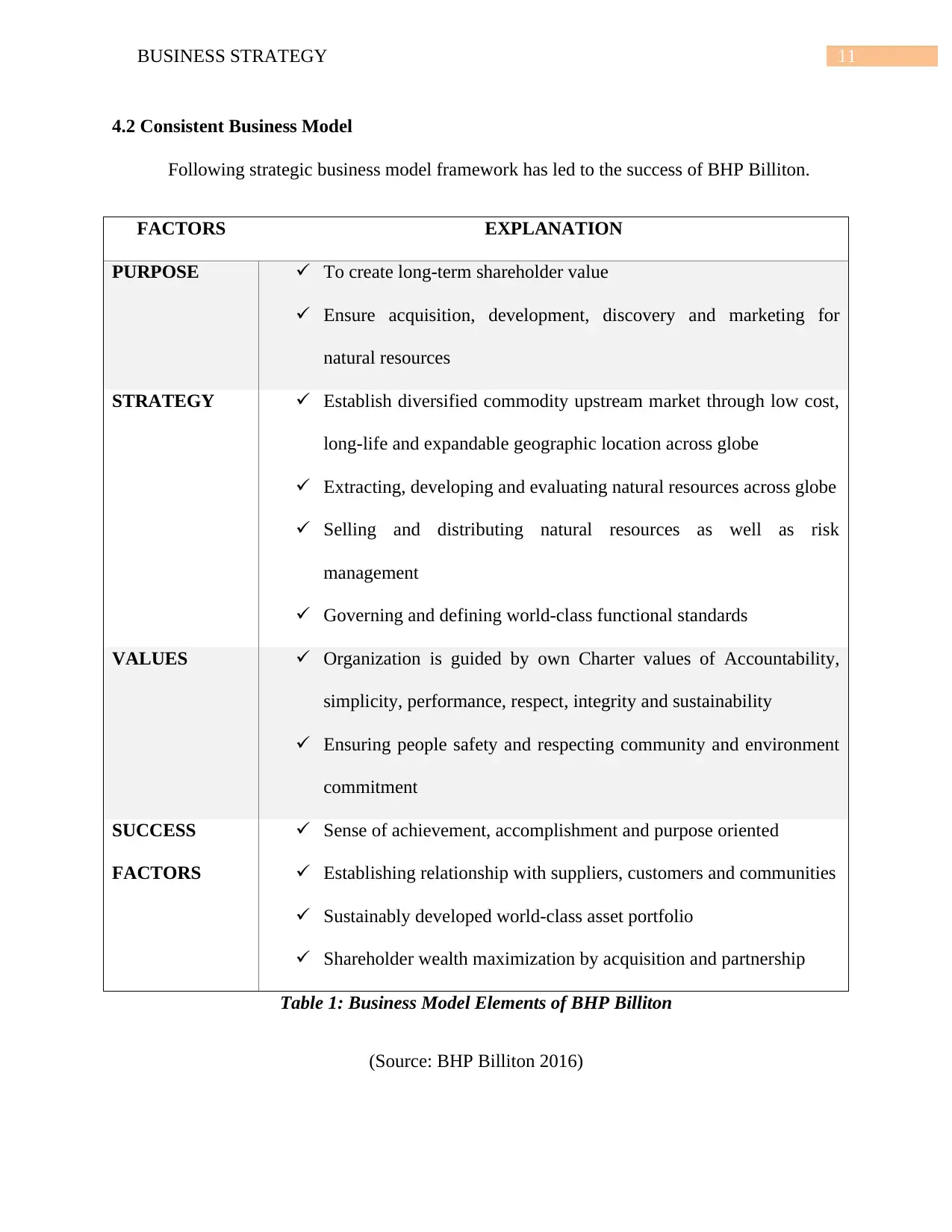
11BUSINESS STRATEGY
4.2 Consistent Business Model
Following strategic business model framework has led to the success of BHP Billiton.
FACTORS EXPLANATION
PURPOSE To create long-term shareholder value
Ensure acquisition, development, discovery and marketing for
natural resources
STRATEGY Establish diversified commodity upstream market through low cost,
long-life and expandable geographic location across globe
Extracting, developing and evaluating natural resources across globe
Selling and distributing natural resources as well as risk
management
Governing and defining world-class functional standards
VALUES Organization is guided by own Charter values of Accountability,
simplicity, performance, respect, integrity and sustainability
Ensuring people safety and respecting community and environment
commitment
SUCCESS
FACTORS
Sense of achievement, accomplishment and purpose oriented
Establishing relationship with suppliers, customers and communities
Sustainably developed world-class asset portfolio
Shareholder wealth maximization by acquisition and partnership
Table 1: Business Model Elements of BHP Billiton
(Source: BHP Billiton 2016)
4.2 Consistent Business Model
Following strategic business model framework has led to the success of BHP Billiton.
FACTORS EXPLANATION
PURPOSE To create long-term shareholder value
Ensure acquisition, development, discovery and marketing for
natural resources
STRATEGY Establish diversified commodity upstream market through low cost,
long-life and expandable geographic location across globe
Extracting, developing and evaluating natural resources across globe
Selling and distributing natural resources as well as risk
management
Governing and defining world-class functional standards
VALUES Organization is guided by own Charter values of Accountability,
simplicity, performance, respect, integrity and sustainability
Ensuring people safety and respecting community and environment
commitment
SUCCESS
FACTORS
Sense of achievement, accomplishment and purpose oriented
Establishing relationship with suppliers, customers and communities
Sustainably developed world-class asset portfolio
Shareholder wealth maximization by acquisition and partnership
Table 1: Business Model Elements of BHP Billiton
(Source: BHP Billiton 2016)
⊘ This is a preview!⊘
Do you want full access?
Subscribe today to unlock all pages.

Trusted by 1+ million students worldwide
1 out of 22
Related Documents
Your All-in-One AI-Powered Toolkit for Academic Success.
+13062052269
info@desklib.com
Available 24*7 on WhatsApp / Email
![[object Object]](/_next/static/media/star-bottom.7253800d.svg)
Unlock your academic potential
Copyright © 2020–2026 A2Z Services. All Rights Reserved. Developed and managed by ZUCOL.





